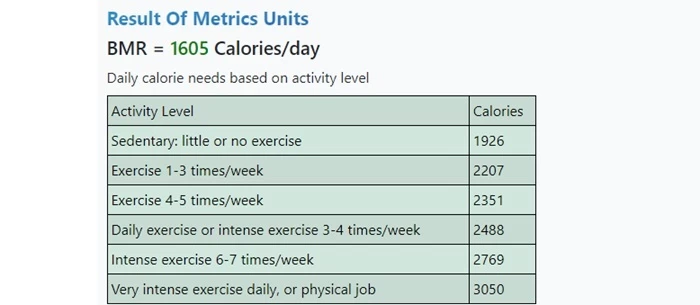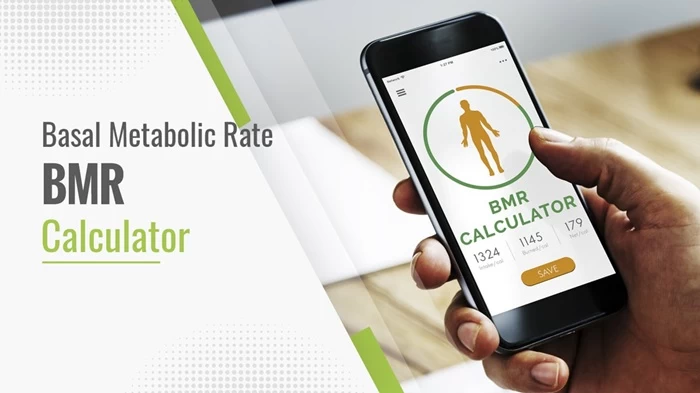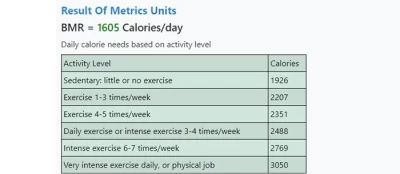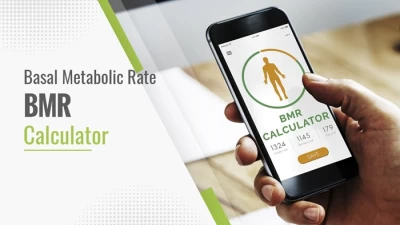BMR calculator: Understanding Your BMR for Optimal Health and Wellness
Discover the key to optimal health and wellness with our BMR calculator guide. Unlock the secrets of your Basal Metabolic Rate (BMR) and understand how it influences your fitness journey.

Imagine your body as a high-tech machine that needs energy to run, even when you're just chilling and not doing anything. Well, that baseline energy your body needs to keep the lights on, so to speak, is called Basal Metabolic Rate or BMR. Think of BMR as the number of calories your body burns at rest – to keep your heart beating, lungs breathing, and all the other vital stuff happening without you consciously doing a thing. It's like the energy your body needs to survive if you were lying in bed all day binge-watching your favourite shows.
Why is it important to know your BMR? Well, it gives you a solid idea of the minimum fuel your body needs to function. Knowing your BMR is like having the key to your body's engine – you can figure out how much fuel (calories) it needs to stay operational. Understanding your BMR is a game-changer for anyone looking to manage their weight. If you consume fewer calories than your BMR, you might lose weight. If you go over, you could gain. It's like knowing the secret code to keep your body's energy balance in check.
Customization of BMR calculations:
When it comes to calculating your Basal Metabolic Rate (BMR), it's essential to understand that everyone is unique. BMR is the number of calories your body needs at rest to maintain essential bodily functions like breathing and circulation. Customizing this calculation involves taking into account individual factors that influence your metabolism.
Firstly, age plays a role. As you age, your BMR generally decreases. This is because, over time, your body tends to lose muscle mass, which is a critical factor in determining your metabolic rate. Therefore, a customization factor is applied to adjust for the impact of age on your BMR. Secondly, your gender matters. Men and women have different BMRs due to differences in body composition and hormonal influences. Typically, men have a higher muscle mass, which leads to a higher BMR. Therefore, the calculation is customized based on whether you are male or female.
Thirdly, your weight is a crucial factor. Heavier individuals generally have a higher BMR because it takes more energy to maintain a larger body. Customizing the BMR calculation involves considering your weight as a factor in determining your metabolic rate. Additionally, height is taken into account. Taller individuals may have a slightly higher BMR, as it requires more energy to maintain the body's essential functions in a larger frame. Customizing the BMR calculation includes factoring in your height to get a more accurate estimation. Lastly, the level of physical activity you engage in is considered. If you lead an active lifestyle, your total daily energy expenditure is higher than someone who is sedentary. The BMR calculation can be customized by incorporating an activity factor to better reflect your energy needs.

Benefits of BMR (Basal Metabolic Rate) Calculator:
- Understand Your Caloric Needs: BMR helps you figure out how many calories your body needs at rest. This is like the energy your body uses to breathe, pump blood, and do other essential functions.
- Personalized Diet Plans: Knowing your BMR helps in creating a diet plan that suits your body. If you eat more calories than your BMR, you gain weight. If you eat less, you lose weight.
- Set Realistic Goals: If you're trying to lose or gain weight, BMR helps you set realistic goals. It gives you a baseline to work from.
- Monitor Health Changes: Changes in your BMR can indicate changes in your health. If it increases or decreases, it might be a sign of changes in your body, like muscle loss or gain.
Real-Life Applications:
- Weight Management: BMR helps you understand the minimum calories your body needs. If you want to lose weight, you can create a calorie deficit (consume fewer calories than your BMR). If you're going to gain weight, you can create a surplus (consume more calories).
- Fitness Planning: For athletes and people into fitness, knowing their BMR helps in planning their nutrition to support their energy needs for workouts and recovery.
- Health Monitoring: Changes in BMR can be a sign of health issues. If it unexpectedly goes up or down, it could be a signal to check in with a healthcare professional.
- Understanding Metabolism: BMR is a part of your metabolism. Knowing it helps you understand how fast or slow your body burns calories, which is crucial for weight management.
- Meal Planning: BMR is the basis for planning your meals. It helps you distribute your daily caloric intake throughout the day to maintain energy levels. CoolCalculator offers a selection of calculators for different purposes; explore the website to find the ones that suit your needs.

Imagine your body as a high-tech machine that needs energy to run, even when you're just chilling and not doing anything. Well, that baseline energy your body needs to keep the lights on, so to speak, is called Basal Metabolic Rate or BMR. Think of BMR as the number of calories your body burns at rest – to keep your heart beating, lungs breathing, and all the other vital stuff happening without you consciously doing a thing. It's like the energy your body needs to survive if you were lying in bed all day binge-watching your favourite shows.
Why is it important to know your BMR? Well, it gives you a solid idea of the minimum fuel your body needs to function. Knowing your BMR is like having the key to your body's engine – you can figure out how much fuel (calories) it needs to stay operational. Understanding your BMR is a game-changer for anyone looking to manage their weight. If you consume fewer calories than your BMR, you might lose weight. If you go over, you could gain. It's like knowing the secret code to keep your body's energy balance in check.
Customization of BMR calculations:
When it comes to calculating your Basal Metabolic Rate (BMR), it's essential to understand that everyone is unique. BMR is the number of calories your body needs at rest to maintain essential bodily functions like breathing and circulation. Customizing this calculation involves taking into account individual factors that influence your metabolism.
Firstly, age plays a role. As you age, your BMR generally decreases. This is because, over time, your body tends to lose muscle mass, which is a critical factor in determining your metabolic rate. Therefore, a customization factor is applied to adjust for the impact of age on your BMR. Secondly, your gender matters. Men and women have different BMRs due to differences in body composition and hormonal influences. Typically, men have a higher muscle mass, which leads to a higher BMR. Therefore, the calculation is customized based on whether you are male or female.
Thirdly, your weight is a crucial factor. Heavier individuals generally have a higher BMR because it takes more energy to maintain a larger body. Customizing the BMR calculation involves considering your weight as a factor in determining your metabolic rate. Additionally, height is taken into account. Taller individuals may have a slightly higher BMR, as it requires more energy to maintain the body's essential functions in a larger frame. Customizing the BMR calculation includes factoring in your height to get a more accurate estimation. Lastly, the level of physical activity you engage in is considered. If you lead an active lifestyle, your total daily energy expenditure is higher than someone who is sedentary. The BMR calculation can be customized by incorporating an activity factor to better reflect your energy needs.

Benefits of BMR (Basal Metabolic Rate) Calculator:
- Understand Your Caloric Needs: BMR helps you figure out how many calories your body needs at rest. This is like the energy your body uses to breathe, pump blood, and do other essential functions.
- Personalized Diet Plans: Knowing your BMR helps in creating a diet plan that suits your body. If you eat more calories than your BMR, you gain weight. If you eat less, you lose weight.
- Set Realistic Goals: If you're trying to lose or gain weight, BMR helps you set realistic goals. It gives you a baseline to work from.
- Monitor Health Changes: Changes in your BMR can indicate changes in your health. If it increases or decreases, it might be a sign of changes in your body, like muscle loss or gain.
Real-Life Applications:
- Weight Management: BMR helps you understand the minimum calories your body needs. If you want to lose weight, you can create a calorie deficit (consume fewer calories than your BMR). If you're going to gain weight, you can create a surplus (consume more calories).
- Fitness Planning: For athletes and people into fitness, knowing their BMR helps in planning their nutrition to support their energy needs for workouts and recovery.
- Health Monitoring: Changes in BMR can be a sign of health issues. If it unexpectedly goes up or down, it could be a signal to check in with a healthcare professional.
- Understanding Metabolism: BMR is a part of your metabolism. Knowing it helps you understand how fast or slow your body burns calories, which is crucial for weight management.
- Meal Planning: BMR is the basis for planning your meals. It helps you distribute your daily caloric intake throughout the day to maintain energy levels. CoolCalculator offers a selection of calculators for different purposes; explore the website to find the ones that suit your needs.
Conversation
Latest Blogs
© Blog CoolCalculator, Explore CoolCalculator, your destination for the latest insights, tips, and updates on the world of online calculators. Stay informed and make your calculations smarter with our blog. ,
Designed
by Saad Media Team , Team Lead M.Rizwan Akhtar












